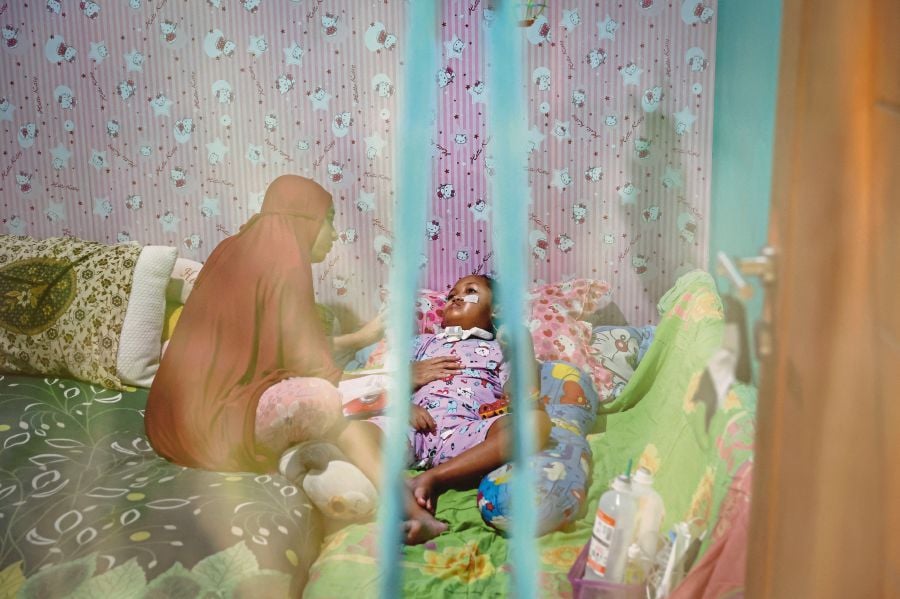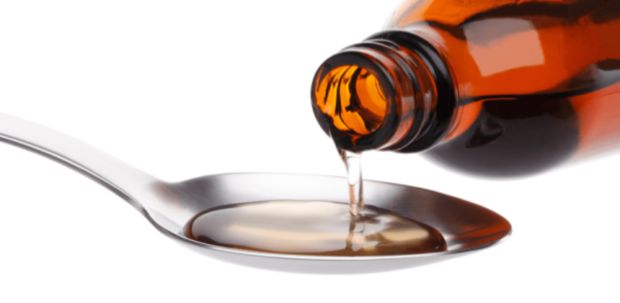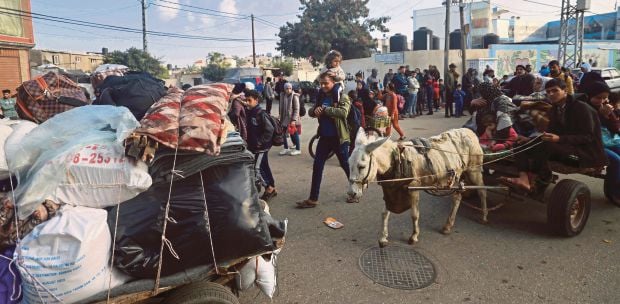DEVOURING books from a young age, Sheena Almaera Maryam had been excited about her first day of kindergarten near Jakarta.
But when she developed a fever in September 2022, the syrup she was prescribed turned out to be toxic.
It ravaged her internal organs. Now the 5 year old spends her days lying in a room lined with Hello Kitty wallpaper, staring blankly up at a baby mobile, her mother Desi Permatasari told Reuters.
Sheena is one of hundreds of children from Gambia to Uzbekistan found by national authorities and the World Health Organisation (WHO) to have been poisoned by contaminated medicinal syrups in the past two years, in one of the largest episodes of such contamination on record.
The rash of poisonings led to criminal probes and lawsuits in at least four countries, a surge in regulatory scrutiny, and families with children dead or disabled.
More contaminated syrups were found in new regions this month, and the WHO has said they could continue to be found for several years.
CRIPPLING DISABILITIES
Sheena lives in the worst affected country: more than 200 children in Indonesia died of acute kidney injury caused by the poison.
Indonesia also has the most survivors — 122 children, according to Health Minister Budi Gunadi Sadikin. The ministry says most have since been "cured" but six are still undergoing treatment.
Some of them, like Sheena, have crippling disabilities. Reuters' images of them at home offer a rare look at survivors and their parents in the aftermath of Indonesia's contamination tra-gedy. The news agency also interviewed three of the families.
"The doctor said her brain is damaged from the poison," said Sheena's mother. "She can only lay down."
The toxins were contained in syrups made by at least three Indonesian drugmakers, according to national regulators and the WHO.
One, Afi Farma, has been prosecuted along with two raw materials suppliers, CV Samudera Chemical and CV Anugerah Perdana Gemilang.
In November, four Afi Farma officials, including chief executive Arief Prasetya Harahap, and two officials from each of the suppliers were convicted of violating pharmaceutical production laws.
The Afi Farma executives were each sentenced to two years' jail; the other four got 10 years each.
The brightly coloured Afi Farma syrups — such as the medicine taken by Sheena — contained ethylene glycol (EG), a commonly used chemical in products such as brake fluid and antifreeze.
The EG concentration in the syrup base was as high as 99 per cent, court documents showed. International standards say only a trace amount of EG, 0.1 per cent, is safe in the legal base ingredient, propylene glycol.
On Nov 2, 2022, the WHO warned that eight products made by four companies, including Afi Farma, contained dangerous levels of EG or a related toxin, diethylene glycol (DEG).
The Afi Farma executives deny intentionally supplying drugs containing deadly ingredients and have appealed, their lawyer Reza Wendra Prayogo told Reuters.
Officials at the two suppliers, CV Samudera Chemical and CV Anugerah Perdana Gemilang, did not respond to requests for comment.
Indonesia's food and drug regulator, Badan POM, told Reuters in May it has tightened its import rules and increased inspections by 20 per cent, but did not respond to subsequent requests for comment.
President Joko Widodo's office did not respond to questions.
COMPENSATION
Indonesia's Health Ministry said in November this year it would provide 50 million rupiah compensation to families of children who died, and 60 million rupiah to the survivors' families.
Sheena's mother, Desi, said she is struggling to pay for hospital visits and has put her home up as collateral for a loan to fund medical bills for her child.
She and 31 other families are also suing the health and finance ministries, Badan POM, Afi Farma and two suppliers for more. They're seeking 3.4 billion rupiah for each child who died, and 2.2 billion rupiah for survivors.
Safitri Puspa Rani, a spokesperson for parents in that suit, said this week that parents had yet to receive any compensation. The Social Affairs Ministry, which disburses such funds, did not respond to questions on that point.
Asked about the compensation offer, Indonesia's Health Ministry said in a Dec 7 statement to Reuters: "According to our calculations, the compensation is fitting."
Governments in other countries where children fell victim to contaminated syrup have offered compensation to families whose children died.
A court in India's Jammu and Kashmir region last year ordered the region to pay the families of 12 children 300,000 rupees each in compensation over a poisoning in 2020.
In the Gambia poisonings, Gambia's government offered families 14,000 dalasis each; those families are also pursuing more, one of their representatives said.
"Given Sheena's condition, we have to think every day about how to buy Sheena milk and diapers," Desi told reporters at a news conference this week organised by lawyers, who said they are representing the parents pro bono in the case.
In Indonesia, baby Rayvan Aji Pratama was given the Afi Farma paracetamol syrup in May 2022, at just 9 months old. He now requires care 24 hours a day, seven days a week.
His father, Riang Triaji, quit his full-time job as a chauffeur to care for Rayvan.
Riang and his wife, Resti Safitri, moved in with her mother to save costs. The family earns about 4.5 million rupiah per month, he said, and spends three million rupiah on medical costs.
Rayvan's mother recently took him to a birthday party for a 2 year old in their neighbourhood. The children played. He watched from his mother's arms.
Lawyer Siti Habiba is now representing the 32 families. She said the parents decided to sue in December last year, after eight mediation sessions about responsibility for the poisonings with the government and companies at the central Jakarta court ended in deadlock.
"Companies think it's the government's negligence, and the government thinks vice versa."
In Gambia and elsewhere, poisonings were linked to products made in India, which has moved to shutter and tighten up regulation of some pharma suppliers but hasn't found who was to blame.
In Indonesia, the syrup was domestically produced. Some of it was prescribed through the national health insurance service, BPJS.
CHAIN OF EVENTS
The chain of events that led to the poisonings was made clear in an Indonesian courtroom last month. The court in Kediri, where Afi Farma is based, found it started in 2021.
That year, Samudera, a small soap ingredient supplier struggling during the Covid pandemic, had placed false DOW Thailand labels onto drums containing EG that it sold to distributor Anugerah Perdana Gemilang for several months until May 2022.
The labels stated the drums held pharmaceutical grade propylene glycol, police said. Afi Farma used that to make the syrups, as Reuters has reported.
Samudera's chief executive Endis, who goes by one name, told the court he did not know the product was going to be used in drugs; the company simply repackaged it "to lower expenses", according to the case documents.
Distributor Anugerah Perdana Gemilang issued certificates of ingredient analysis for several batches of the fake propylene glycol to allow its pharmaceutical use — without testing it, the documents said, citing testimony from Anugerah official Aris Sanjaya.
Anugerah supplied the material to Afi Farma's drug ingredient supplier, Tirta Buana Kemindo.
It found its way into 70 batches of Afi Farma cough syrup, the case documents showed. Tirta Buana Kemindo did not respond to requests for comment.
The syrups were distributed to some of the nation's poorest families through the health service. The Health Ministry said it does not collect data on how many children were prescribed the medication through that service.
The health service said its role was to administer payments rather than check drug quality.
It said it does not retain data on the use of medicines and only makes payments based on requests from hospitals and medical services.
Indonesian law has since 2009 obliged pharma firms to ensure their products are safe. Maximum allowed levels for EG in pharmaceutical ingredients were only added to its pharmaceutical standards in 2020.
Afi Farma registered its product in 2021 without EG test results and the court said in Nov-ember in the Afi Farma case that Badan POM, the food and drug regulator, had approved the products "thoughtlessly".
Penny K. Lukito, Badan POM chief at the time, told Parliament in November 2022 there were no safety limits for EG or DEG "in finished products", saying there would be too many products for the agency to test them all individually.
After the outbreak of poisonings in March this year, the Health Ministry updated the standards for the first time explicitly requiring drugmakers to test for EG and DEG.
The writers are from Reuters





